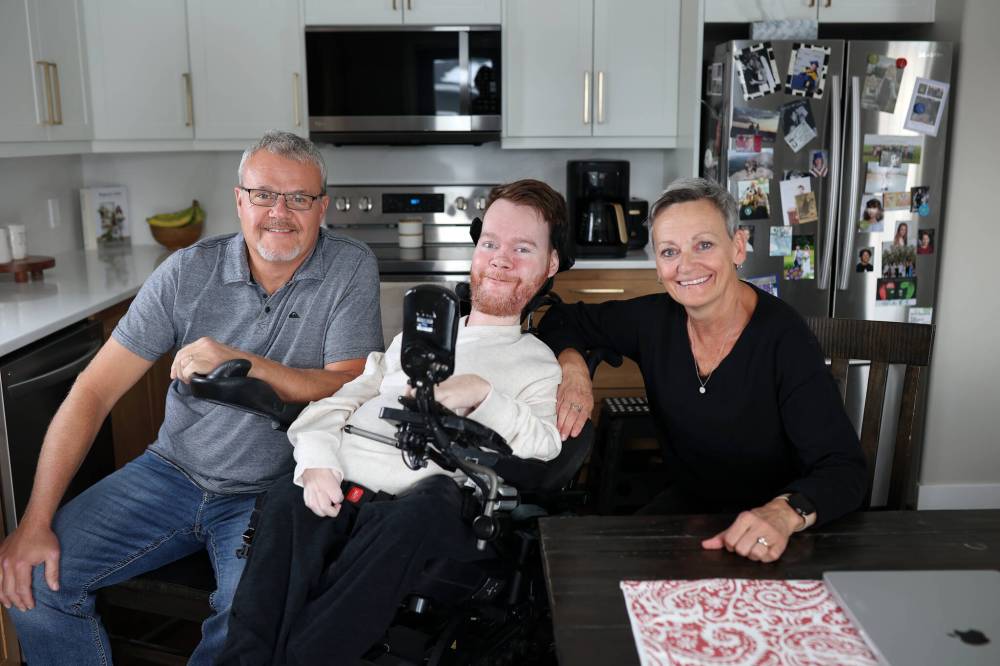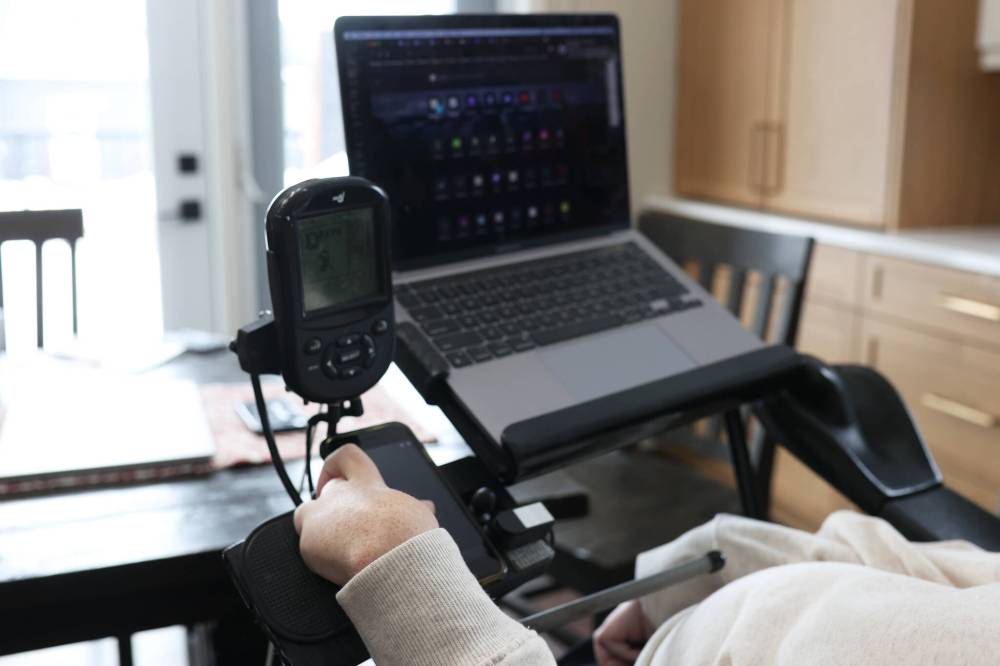Family hopes province will cover drug
Rivers man living with spinal muscular atrophy
Advertisement
Read this article for free:
or
Already have an account? Log in here »
We need your support!
Local journalism needs your support!
As we navigate through unprecedented times, our journalists are working harder than ever to bring you the latest local updates to keep you safe and informed.
Now, more than ever, we need your support.
Starting at $15.99 plus taxes every four weeks you can access your Brandon Sun online and full access to all content as it appears on our website.
Subscribe Nowor call circulation directly at (204) 727-0527.
Your pledge helps to ensure we provide the news that matters most to your community!
To continue reading, please subscribe:
Add Brandon Sun access to your Free Press subscription for only an additional
$1 for the first 4 weeks*
*Your next subscription payment will increase by $1.00 and you will be charged $20.00 plus GST for four weeks. After four weeks, your payment will increase to $24.00 plus GST every four weeks.
Read unlimited articles for free today:
or
Already have an account? Log in here »
Hey there, time traveller!
This article was published 01/03/2025 (251 days ago), so information in it may no longer be current.
RIVERS — A 29-year-old Rivers man is hoping Manitoba’s Health Minister Uzoma Asagwara will take steps to approve coverage for a drug that could improve and extend his quality of life.
It’s a drug Jeremy Bray says he’s missing out on because of his age.
Bray was born with spinal muscular atrophy (SMA), a rare neurodegenerative disease that causes his muscles to progressively weaken.

Jeremy Bray (middle) and his parents, Darren and Tara Bray, are shown at their home in Rivers. Jeremy, who’s 29, lives with spinal muscular atrophy, a neurodegenerative disorder that causes the loss of motor neurons and progressive muscle wasting. There is no cure, but there are treatments that slow the progression. His family is hoping the provincial government will cover the treatment. (Photos by Tim Smith/The Brandon Sun)
“I only have the use of my left thumb and my face and voice, so really, once I lose my thumb, which will happen at some point, I’ll lose the ability to work, to drive my wheelchair, to do a lot of what gives my life meaning,” Bray said.
In 2017, Bray graduated from Brandon University with a bachelor of science in computer science and a minor in English. He lives with his parents and works from home as a full-time data consultant for the Louis Riel School Division.
“I operate my phone with my thumb and on my phone, I have an app that connects to my computer that lets me type, use the mouse and everything else I need to do,” said Bray.
There is no cure for SMA, but there are treatments that can slow its progression.
And for most of Bray’s life, there has never been any treatment, until 2019. That’s when he first had hope about a drug called spinraza, which was approved in Canada. But it was designed for patients under the age of 18, and a case-by-case basis for adults.
In 2021, a drug called risdiplam gave Jeremy, his mom Tara and his dad Darren renewed hope, until they heard the recommendations from Canada’s Drug Agency (CDA).
The federal agency is responsible for co-ordinating drug policy, including which drugs should be covered by federal, provincial and territorial public drug plans.
CDA didn’t recommend treatment for people in Jeremy’s age group because of “limited data on risdiplam for patients over 25 years of age,” according to CDA’s website.
By that point, Jeremy was “26 years old, so I was above that cutoff, and I pretty much missed the window for treatment by about a year,” he said.
What didn’t make sense, Jeremy added, was the rationale that 25-year-olds would be taking the drug for the rest of their lives, yet, as a 29-year-old, he was being excluded.
“It’s not like you turn 25 and suddenly the treatments don’t work anymore, right? It’s kind of an arbitrary cutoff.”
And that’s when, he added, he and his family decided to push back and fight to have the provincial government fund risdiplam and ask for a review of the CDA’s recommendations.
Saskatchewan funds risdiplam on a case-by-case basis, as does Alberta, and is completely funded by the government in Quebec, Jeremy said.
“My original application for both drugs were under the previous Conservative government,” Jeremy said.
“So, when the NDP made a lot of promises around health care, we were pretty optimistic about our chances.”
And after friends and family sent “countless letters and emails to the NDP and our Conservative MLA,” Jeremy and his dad were granted a meeting with Health Minister Uzoma Asagwara on Jan. 21, 2025.
“The health minister was very compassionate and willing to listening to our concerns, and they did commit to applying to the CDA to review their recommendation,” said Jeremy.
“But we don’t really know how long that could take and my condition could progress while we wait for that bureaucratic process,” he said.

Bray uses an iPhone and adaptive technology to work in IT from Rivers. “I only have the use of my left thumb and my face and voice, so really, once I lose my thumb, which will happen at some point, I’ll lose the ability to work, to drive my wheelchair, to do a lot of what gives my life meaning,” he says.
That’s the frustrating part, said Darren — not knowing if the health minister’s office has requested a review.
“One of the commitments the province made to us was to keep the lines of communication open,” Darren said. “And since then, we’ve gotten no response from that office, which is quite frustrating. What has CDA told them as far as the timelines on getting an emergency review done on risdiplam for adults?”
Grant Jackson, the Progressive Conservative MLA for Spruce Woods, said the health minister is not being open or transparent about whether the CDA has acknowledged their letter asking for a review.
“I think the bureaucracy within the health-care system doesn’t want to pay,” Jackson said, “which I find, frankly deplorable. And I think the health minister is afraid to set a precedent, which is shameful, considering their colleagues in other provinces across the country have done so.”
The Sun requested an interview with Asagwara and received an email response, saying they had been in contact with Jeremy and his family.
“I want to thank Jeremy for his persistent and courageous advocacy. My office spoke with Jeremy and his family today (Friday) to update them on our ongoing conversations with the CDA. We continue to urge the CDA to conduct a review of their recommendations as quickly as possible. We will keep updating Mr. Bray regularly as the situation develops,” Asagwara wrote in an email to the Sun.
Without a government drug plan for risdiplam, Jeremy’s mom and dad said the cost of the drug is estimated to be around $300,000 a year.
“That’s not sustainable,” said Darren. “But we’re at the point that we need to take action right away because it’s tough for us to sit around and wait.”
Tara said she has noticed her son losing strength in his one working thumb, and she’s holding out hope that risdiplam will be approved.
“We’re not unrealistic when it comes to what the drug is going to do. All we want is for it to keep him being able to use his thumb and eating and being able to talk,” she said.
“We’re not expecting him to get out of his wheelchair and start walking. We know that’s not going to happen.
“All we’re asking for is to just keep this current state of his health.”
» mmcdougall@brandonsun.com
» enviromichele.bsky.social
